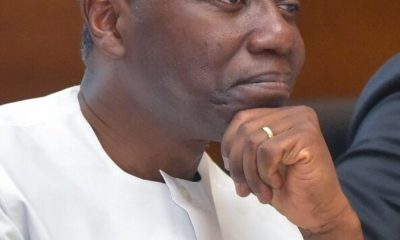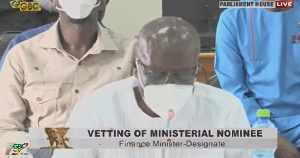Finance
American Advisors On Agyapa Deal Expose Govt’s Hasty Decision

Merrill Lynch, one of the key advisers on the Agyapa deal, has shockingly projected higher gold prices by 2022, thus underscoring the need for Ghanaians to know how the valuation of the royalties was done by the Akufo-Addo government for the Agyapa deal and the danger of undervaluation.
This means Ghana stands to gain more from existing arrangements without rushing into the controversial Agyapa deal, at its present state.
Someone familiar with such businesses told The Herald, how “important it is to know how Merrill Lynch, as Adviser in this Agyapa transaction, has valued Ghana’s royalties assigned by MIIF to Agyapa Royalties, adding “the impression that a deal must be done now because gold prices are at an all-time high, is also exposed as shortsighted”.
Finance Minister, Ken Ofori-Atta on Peace FM last Friday, mentioned Bank of America Merrill Lynch, as one of its advisers on the deal, however, days after that interview, the American company, says it expects gold to hit $3,000 by early 2022, while Citigroup and billionaire Thomas Kaplan, founder of New York-based asset management firm, Electrum Group, believe that $5,000, is in the crosshairs.
This year has been described as an annus mirabilis (remarkable) for gold investors, with the yellow metal running riot.
Gold prices are currently trading at $1,933 per ounce, not far from their historical high of $2,075 that they reached a month ago. That is good for a 26.5percent gain year-to-date and 30.9percent, since their 52-week low in March, compared to a 6.3percent YTD gain by the S&P 500.
The projection comes as civil society groups in the country continue their calls on the Akufo-Addo government to suspend the controversial Agyapa royalties deal, insisting that the deal is being pushed through, despite assurance from Ghana’s Finance Minister that there will be stakeholder consultation in the matter.
In a statement yesterday, the CSOs said: “It is not enough for the Minister of Finance or the government to ask citizens to trust their sincerity and their expertise.
“It would not be right for them to try to bulldoze through a controversial transaction such as this, and about which genuine questions have been raised by experts as well as by ordinary people. We are therefore reiterating our call on the government to suspend implementation of this transaction pending a national dialogue on options available to optimise Ghana’s mineral royalties”.
It comes after Mr Ofori Atta, called on Ghanaians to believe that the government has made the right decisions on the gold royalties deal.
“We are not doing anything for the sake of it, but we are doing what will help the country and the realisation of the President’s vision.
“We have got to a stage in our national development, where we have to move away from using debt to build our economy to using equity, where we can maximise our own resources to achieve more.
“The processes to complete the deal, will not stop, because we know we are doing what is right for the country,” he added.
Alex Kimani of Oilprice.com writes that “the torrid rally represents the sharpest gain the metal has mustered in more than a decade”, adding “that is hardly surprising given gold’s traditional role as a safe haven asset that many investors turn to during times of deep crises–and few can rival the COVID-19-induced economic meltdown.The Covid-19 situation has been improving somewhat, yet hedge funds, Wall Street, and investors alike continue being extremely bullish about gold, with some licking their chops and predicting that the yellow metal could touch absurd levels of as high as $3,000 and even $5,000 per ounce”.
“Bank of America Merrill Lynch says it expects gold to hit $3,000 by early 2022, while Citigroup and billionaire Thomas Kaplan, founder of New York-based asset management firm Electrum Group, believe that $5,000 is in the crosshairs”.
“That certainly sounds like a gold bug’s dream. But what would such a climb imply for the rest of the financial markets?
It said “the virus has certainly unleashed a torrent of forces that have been fueling a relentless demand for gold and its time-honored credentials as a safe haven. Gold markets tend to flourish during times of deep economic crises when bonds offer flat or negative returns or stock markets become too choppy”.
“All these have certainly rung true during the crisis.The global economy was already showing signs of malaise well before the Covid-19 pandemic, prompting the world’s central banks to cut interest rates to historical lows. Investors tend to turn to safe-haven assets like gold during low-interest environments, though the gold-interest rate nexus has been weakening since the 1970s after the U.S. abandoned the gold standard.
“That said, there is a clearer correlation between economic crises and gold rallies. Several months ago, the World Bank sounded the alarm that the crisis was likely to plunge the economy into the worst recession since WWII.
“People tend to flock to safe havens such as gold and silver during times of heightened geopolitical and economic uncertainties, which in turn supports higher gold prices due to gold’s price elasticity as Erb and Harvey noted in The Golden Dilemma. As Citigroup analyst Heath Jansen has pointed out:”When investors are hungry for gold, the metal has a habit of rising exponentially which has no parallel amongst metals.”
“Unprecedented stimulus packages by central banks have also been playing a part in the rally. A few months ago, the world’s central banks doled out huge stimulus packages to the tune of $15 trillion in a bid to shore up the economy against the effects of Covid-19. Whereas this has helped the stock markets to recover at a faster-than-expected clip, the stimulus overkill has, unfortunately, led to the classic cobra effect and unintended consequences, one of them being a weaker dollar. A weaker dollar tends to push up prices of dollar-denominated commodities such as gold.
“The real endgame
Unfortunately, gold prices flirting with five-digit prices would likely be a very bad place to be.
For one, such levels would imply hyperinflation and possibly 1970s-style stagflation in the U.S.
It would imply exceptional political and social unrest and would push the country into a true hyperinflationary death spiral with pretty much all commodity prices skyrocketing. At the same time, the real value of most commodities would decline dramatically as people focused their attention on mere survival.
“If gold prices started to approach $10,000, the dollar would probably lose its status as the world’s pre-eminent currency. Many other fiat currencies would lose value with another currency, such as the Swiss franc taking over as the world’s reserve currency. In desperation, First World governments would likely resort to dirty tricks, including imposing currency controls on any form of money crossing their borders or even confiscating private citizens’ bullion as the U.S. government did during the Great Depression.
“Gold prices are currently sitting near all-time highs. Another 10%, 20%, or even 30% rally from here over the next 12-24 months might not necessarily throw the global economy out of whack. But calling for $5,000 might be biting off more than we can chew.
Source: The Herald
-

 Lifestyle4 weeks ago
Lifestyle4 weeks agoRoad Safety Authority narrates how buttocks causes road accident
-

 GENERAL NEWS1 month ago
GENERAL NEWS1 month agoWhy 15 police officers stormed Owusu Bempah’s church – Kumchacha narrates
-

 GENERAL NEWS4 weeks ago
GENERAL NEWS4 weeks agoWatch how Ibrahim Mahama rode Honda superbike to pay last respects to late friend
-

 GENERAL NEWS1 month ago
GENERAL NEWS1 month agoHow Offinso residents storm destooled queen mother’s house, demand for new chief
-

 South Africa News1 month ago
South Africa News1 month agoWoman thrown out of a speeding taxi while on her way to work
-

 GENERAL NEWS2 weeks ago
GENERAL NEWS2 weeks agoDeadly clash between youth and navy personnel results in two deaths at Tema Manhean
-

 SHOWBIZ KONKONSAH2 weeks ago
SHOWBIZ KONKONSAH2 weeks agoJunior Pope’s Death: Video of John Dumelo refusing to join canoe for movie shoot over safety concerns resurfaces
-

 News Africa2 months ago
News Africa2 months ago‘Satanically dubious’ – SCOAN releases statement on BBC’s report about TB Joshua, church







